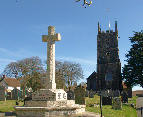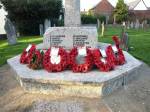Fred Letheren was born c.1886 in Chawleigh, the son of John Letheren, the Winkleigh village baker who in 1991 was living on Cooperís Hill, with his wife Rebecca, Fred aged 5 and four younger girls. Fred attended Winkleigh School, and in common with others carrying the Letheren name attended as long as was possible, up to 14 years old. In 1891, aged 15, he is recorded as a draperís apprentice, living with Frederick Letheren in Fore Street, Chumleigh. Much seems to have happened during the next 10 years, because in the 1911 census Fred was living in the household of his cousin Thomas Hammett at 8 Salisbury Pavement, Davis Hill, Fulham, and working as an assistant butcher. Living there also was Martha Dulling, Thomas Hammettís neice, another branch of this extended family in Winkleigh.
Fredís father, John Letheren was a well-beloved resident, a military man who had served in the militia and who was always known in the village as ĎSgt. Letherení. The School Board reported in 1894 that Sgt. J. Letheren had been appointed attendance officer. Fred was then 8 yrs. old: obviously his father encouraged his children as much as possible to make the most of the education available, and indeed in the years before his death John Letheren was the Clerk of the school. The Letheren name was the most widespread of the families in Winkleigh: the 1901 census, for example, records 6 heads of Letheren family units: James the bank manager, John the baker now in Cross Street, Lucina a baker in the High Street, Thomas a labourer in Star Barn, Annie a draper in the High Street, and Frederick a saddler and harness maker in the High Street. Johnís death in June 1915 was widely reported. The Western Times of 29th June 1915 and The North Devon Journal of 1st July 1915 both carried: the same account:
It is with profound sorrow that we record the death Mr. John H. Letheren, of Winkleigh, whose illness of about twelve days culminated on Friday morning in his demise at the comparative early age of 56 years, from hemorrhage. The deceased was well known throughout a very large area, was highly respected and much beloved, his kind-hearted, thoughtful deeds will ever live in one's memory. He was most unselfish, and ever willing to oblige and do a kindly act. Hence he endeared himself to everyone with whom he came in contact. He had for many years carried on a successful business as a baker, etc., and covered a large district. Recently he retired from business, having given over the concern to Mr. Wright, his son-in-law. Mr. John Letheren had long been associated with matters of local interest, in which he took an active part, and was ever ready to help forward a good cause, whether it was in the church, the Parish Council, as a member of the Lighting Association, Bowling Club, or any other local office, he rendered valuable help. But his especial delight was in Army matters and discipline. He was a sergeant in the old Volunteers, and was helpful and largely instrumental in forming a section at Winkleigh. Passing on to the Territorials, continued to render valuable assistance, and one of his own premises is present known as the "Armoury." and be it noted that nearly thirty Winkleigh Territorials are serving the Colours. Sergeant Letheren, as he was generally known locally, recently remarked that he thought every able person should do what they could for his King and Country, and it was sore displeasure to him that he had not been accepted for military service. But he mentioned with pride that at least he would do what he could, and offered himself as a special constable. He had been measured for his outfit, and was awaiting it when his sad death intervened. His only son, Fred, has been serving in France with the A.S.C. Motor Transport, and being wired for, arrived home, only too late see his father alive. There is profound sorrow in the village, and the utmost' sympathy felt for the sorrowing widow, son and daughter.
A photo, reproduced on this site, appeared in the Devon and Exeter Gazette for July 3rd 1915
Aged 28 when the war broke out, we know that Fred joined up almost immediately, as his medal card shows that he went to France on 11th May 1915. Sadly his military records were destroyed in the London blitz. Certainly he was one of the vast numbers of volunteers who were fighting in France or Belgium before conscription was introduced in 1916. The Chumleigh Deanery Magazine, which published Winkleigh news at a time when there was as yet no Parish magazine, did not record that Fred had joined early. Living away from Winkleigh this is of course understandable, but is alternatively very possibly because the Letheren family were Chapel supporters We can guess this because the 1891 Census records that Raymont, one of the Winkleigh tailors and serving as the Wesleyan Minister, was boarding at the time with the family.
Fredís medal card shows his role in the ASC was in Motor Transport (M2), a clear indication that he had enlisted into Kitchenerís New Army, either as a qualified driver or as a learner driver. We also see that he first went to France on 11th May 1915. The British Army was already the most mechanized in the world when the Great War began, in terms of use of mechanical transport. It maintained that leadership, and by 1918 this was a strategically important factor in being able to maintain supply as the armies made considerable advances over difficult ground. All Mechanical Transport Companies were part of the Lines of Communication and were not under orders of a Division, although some (unusually known as Divisional Supply Columns and Divisional Ammunition Parks) were in effect attached to a given Division and worked closely with it. Those in the Lines of Communication operated in wide variety of roles, such as being attached to the heavy artillery as Ammunition Columns or Parks, being Omnibus Companies, Motor Ambulance Convoys, or Bridging and Pontoon units. Without Fredís military records it is impossible to say in which company he served, or his particular occupation.
Fredís medal card shows that he was awarded the British, Victory and 1915 medals. He was demobilised into the usual Class Z reserve on 15thJuly 1919.
16 July 2011


